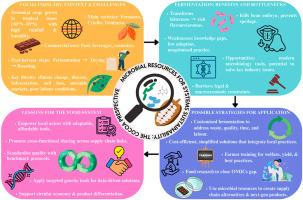Microbial resources for food system sustainability: Lessons from the cocoa industry
IF 15.4
1区 农林科学
Q1 FOOD SCIENCE & TECHNOLOGY
引用次数: 0
Abstract
Background
The food system faces significant challenges with complex interrelations linked to issues like climate change, loss of biodiversity, human rights violations as well as food insecurity. Actors in the food system use different strategies to mitigate these issues and their interactions, from many perspectives like production, consumption and policy.
Scope and approach
This paper examines how emerging tools in microbiology can tackle some of these systemic problems using the lens of the cocoa industry. The paper uses a practical SWOT (Strengths-Weakness-Opportunities-Threats) framework to draw parallels on the inherent advantages and limitations of the microbial tools (Strengths and weaknesses) while also contextualizing them into the broader framework of our existing food system based on external factors (Opportunities and threats). Thus, this analysis highlights the role of different microorganisms and how they can be leveraged with the latest technological tools to address pervasive issues in the food system.
Key findings and conclusions
The paper explores latest advancements in the field of food microbiology, extrapolating its potential to directly address issues by using the case of the cocoa industry. The limitations of these tools and the issues with implementation are also discussed to highlight future avenues for researching strategies to overcome them. Finally, an argument is made for how these tools can also be applied in the larger food system for innovate solutions for the future.

粮食系统可持续性的微生物资源:来自可可工业的经验教训
粮食系统面临着重大挑战,与气候变化、生物多样性丧失、侵犯人权和粮食不安全等问题存在复杂的相互关系。粮食系统中的行动者从生产、消费和政策等多个角度,采用不同的策略来缓解这些问题及其相互作用。范围和方法本文考察了新兴的微生物学工具如何利用可可工业的透镜来解决这些系统性问题。本文使用实用的SWOT(优势-劣势-机会-威胁)框架,对微生物工具的固有优势和局限性(优势和劣势)进行类比,同时根据外部因素(机会和威胁)将它们置于我们现有食品系统的更广泛框架中。因此,这一分析强调了不同微生物的作用,以及如何利用最新的技术工具来解决食品系统中普遍存在的问题。主要发现和结论本文探讨了食品微生物学领域的最新进展,并通过使用可可工业的案例推断其直接解决问题的潜力。还讨论了这些工具的局限性和实施中的问题,以突出未来研究克服这些工具的策略的途径。最后,讨论了如何将这些工具也应用于更大的食品系统,以创新未来的解决方案。
本文章由计算机程序翻译,如有差异,请以英文原文为准。
求助全文
约1分钟内获得全文
求助全文
来源期刊

Trends in Food Science & Technology
工程技术-食品科技
CiteScore
32.50
自引率
2.60%
发文量
322
审稿时长
37 days
期刊介绍:
Trends in Food Science & Technology is a prestigious international journal that specializes in peer-reviewed articles covering the latest advancements in technology, food science, and human nutrition. It serves as a bridge between specialized primary journals and general trade magazines, providing readable and scientifically rigorous reviews and commentaries on current research developments and their potential applications in the food industry.
Unlike traditional journals, Trends in Food Science & Technology does not publish original research papers. Instead, it focuses on critical and comprehensive reviews to offer valuable insights for professionals in the field. By bringing together cutting-edge research and industry applications, this journal plays a vital role in disseminating knowledge and facilitating advancements in the food science and technology sector.
 求助内容:
求助内容: 应助结果提醒方式:
应助结果提醒方式:


